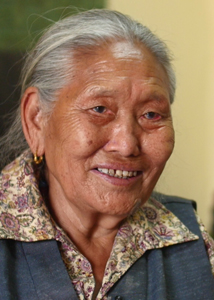Name: Sonam Dolma
(Alias: No)
Gender: Female
Interview Age: 77
Date of Birth: 1940
Birthplace: Tsang, Utsang, Tibet
Year Left Tibet: 1960
Profession: Farming, Herding
Monk/Nun: No
Political Prisoner: No

Interview No.: 17U
Date: 2017-04-03
Language: Tibetan
Location: Rajpur, Uttarakhand, India
Categories: Culture and History
Keywords: childhood memories, clothing/weaving, customs/traditions, farm life, food/drink, government/administration, houses/villages, nomadic life, Utsang
Summary:
Sonam Dolma was born in 1940 in Tsang, Utsang Province, whose residents paid taxes to the District of Zongkar. Her family was samadok 'farmers and herders,' who divided their work between growing barley, wheat and peas and raising several types of domestic animals. They led a self-sufficient life because they got everything they needed from the fields and animals. Sonam Dolma's family moved up into the mountains with the animals during summertime when the crops were growing in the fields.
The animals raised by Sonam Dolma's family were sheared during springtime and they spun the wool by hand. She explains the process of weaving the wool to make tents from yak hair. In her region the woven tent was used only as a roof placed over a stone structure that was left standing when they moved. Goat hair was used to make bags for transporting soil and barley on the yaks. Clothing was also made from the wool and dyed.
Sonam Dolma explains how disputes were settled by the district administrator, who gave lashings to both the parties under the assumption that only the guilty one would cry out in pain. She also talks about how they atoned for the negative action of slaughtering sheep for consumption by lighting butter lamps.
Interview Team:
- Marcella Adamski (Interviewer)
- Tenzin Yangchen (Interpreter)
- Tenzin Choenyi (Videographer)

